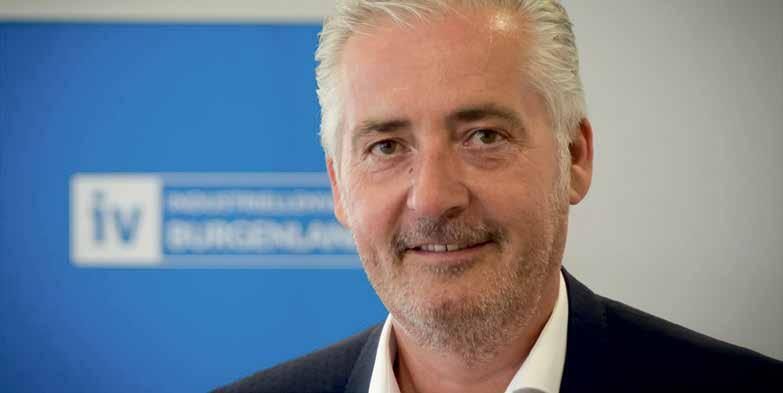
4 minute read
Burgenland is focusing on digitisation
by medianet
Manfred Gerger, President of the Burgenland Federation of Industries, on “his” businesses and the positive side of the Covid pandemic – the much-needed rapid increase in digitisation.
The Austrian Institute for SME Research’s economic report for Burgenland’s trade and craft sector has given reason for hope: Companies ranked the business situation in the 2nd quarter of 2021 considerably better than in the same quarter of the previous year. Even though supply difficulties and price increases continue to cause concern, especially in the investment goods sectors, the outlook for the third quarter is one of cautious optimism. The shortage of skilled workers remains a problem.
Advertisement
Burgenland’s companies in both the capital goods sector as well as in consumer related sectors are optimistic. A survey by the Austrian Institute for SME Research also showed that one in four companies is looking for employees.
“The capital goods related industries, which primarily include the trades in the construction industry, can not complain about the lack of orders. However, these businesses are suffering as a result of the strained situation on the procurement market,” explained Division Chairman Gerald Guttmann from the Burgenland Economic Chamber. “It is encouraging to note that for the first time since the 4th quarter of 2019, businesses in the consumer-related sector (automotive/mechatronics, food, health/wellness, creative/design) are once again predominating with optimistic turnover expectations.”
Economic survey in the industry sector
The economic survey for the 2nd quarter of 2021 by the Burgenland Federation of Industries and the Industry Division of the Burgenland Economic Chamber also paints a much more positive picture than in the previous quarters. For almost all of the indicators queried, the assessment is more optimistic and in part much better than in the previous quarter. However, this does not mean that we can predict that the situation will ease in the long term. The booming global economy is causing problems in the supply chain of domestic companies and is causing costs to increase rapidly. Burgenland’s industry can also be very pleased with the high-capacity utilisation and the full order books, but at the same time faces the problem of significantly increased costs, explains Ingrid Puschautz-Meidl, Managing Director of the Burgenland Federation of Industries. “Many companies are operating at full capacity, but whether this will result in an economic success remains to be seen due to the uncertainty of rising costs.”
It is positive to note that 19 percent of the companies surveyed want to employ new staff in the next three months. “However, recruiting more employees in Burgenland is becoming increasing-

Manfred Gerger, President of the Burgenland Federation of Industries: “The shortage of skilled staff was already a problem before the Covid pandemic, and it has become even more acute now.”
ly difficult due to the shortage of highly-qualified employees in the STEM subjects,” says Puschautz-Meidl, who confirms the increasing problem of finding the right staff.
Manfred Gerger, President of the Burgenland Federation of Industries, knows more about Burgenland’s industrial firms.
Mr Gerger, how are Burgenland’s businesses doing?
The economy is picking up speed rapidly, the order books in some parts are also full. Unfortunately, the scarcity of raw materials and a shortage of skilled workers right through all levels of qualifications is holding back an economic upswing. Only a small proportion of companies are benefiting from the massive rise in raw material prices caused by the high demand. The other companies are suffering from a lack of earnings because the increasing costs can not be passed on directly to the customers. The shortage of skilled staff was already a problem before the Covid pandemic, and it has become even more acute now. What we need is a holistic strategy that includes all the relevant topics.
The number of vaccinations kept rising before the summer while the number of infections fell. We seem to have overcome the worst. But have we really? Is the crisis over? What do we need to look out for now? As global travel is still restricted due to the Covid pandemic and the vaccination rate is still not close to the important 80 percent mark, it is not possible to talk about an end to this crisis. The uncertainty of what autumn will bring in terms of infection figures and possible new restrictions is also having an impact on the mood throughout the industry. What we need therefore is a more rapid rate of vaccination in the population, combined with better information for those who refuse to be vaccinated.
We all should always think positive – so what are the positive findings you are taking with you from the Covid crisis? I have been very impressed by the incredible flexibility of the entrepreneurs and their employees in overcoming the crisis. The enormous digitisation drive that has swept through all areas of life has been of great importance for the country. Without this crisis, we would never have caught up so quickly in this area.
And what is the Burgenland Federation of Industries planning for next year? The focus of our work will be increasingly on digitisation, research and development, resource management and in the recruitment, training and development of employees.
Acting as a location advocate, we are always trying to play an active role in shaping the framework conditions in the province and on a federal level. ◆










